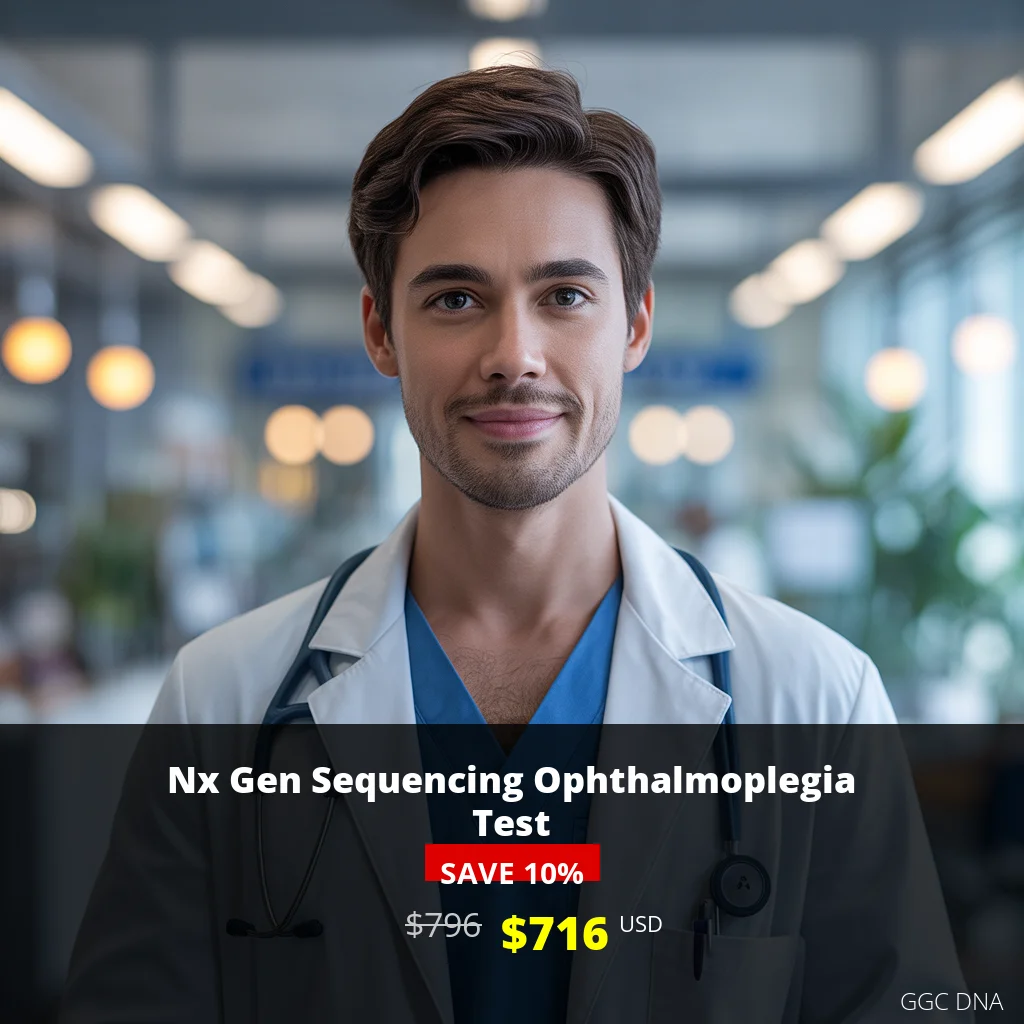Nx Gen Sequencing Ophthalmoplegia Test
Comprehensive Genetic Testing for Eye Muscle Disorders
The Nx Gen Sequencing Ophthalmoplegia Test represents a breakthrough in genetic diagnostics for patients experiencing progressive external ophthalmoplegia and related eye movement disorders. This advanced molecular test utilizes cutting-edge next-generation sequencing (NGS) technology to analyze eight critical genes associated with mitochondrial dysfunction and neuromuscular coordination of the eyes.
What Does This Test Measure?
Our comprehensive genetic panel specifically targets mutations in the following eight genes known to cause ophthalmoplegia:
- C10orf2 – Associated with mitochondrial DNA replication disorders
- DNA2 – Involved in mitochondrial DNA maintenance
- OPA1 – Critical for mitochondrial fusion and optic atrophy
- POLG – DNA polymerase gamma, essential for mitochondrial DNA synthesis
- POLG2 – Accessory subunit of DNA polymerase gamma
- RRM2B – Ribonucleotide reductase regulatory TP53 inducible subunit
- SLC25A4 – Adenine nucleotide translocator 1
- TYMP – Thymidine phosphorylase, associated with mitochondrial neurogastrointestinal encephalopathy
Who Should Consider This Test?
This genetic test is particularly recommended for individuals experiencing:
- Progressive limitation of eye movements in all directions
- Bilateral ptosis (drooping eyelids)
- Double vision or blurred vision
- Family history of mitochondrial disorders
- Unexplained weakness of extraocular muscles
- Progressive external ophthalmoplegia symptoms
- Associated systemic symptoms like muscle weakness or exercise intolerance
Key Benefits of Genetic Testing
- Accurate Diagnosis: Provides definitive genetic confirmation of ophthalmoplegia causes
- Personalized Treatment: Enables targeted therapeutic approaches based on specific genetic mutations
- Family Planning: Offers valuable information for genetic counseling and family risk assessment
- Prognostic Insights: Helps predict disease progression and potential complications
- Early Intervention: Facilitates timely management strategies to preserve vision and eye function
Understanding Your Test Results
Your genetic test report will provide detailed information about detected mutations and their clinical significance:
- Positive Result: Indicates the presence of pathogenic mutations associated with ophthalmoplegia, requiring consultation with a specialist for comprehensive management
- Negative Result: Suggests that no known pathogenic mutations were detected in the tested genes, though other genetic or non-genetic causes may still be considered
- Variant of Uncertain Significance: Some genetic changes may have unknown clinical implications, requiring further evaluation and possibly family studies
All results should be interpreted by a qualified genetic counselor or ophthalmologist who can provide personalized medical guidance based on your specific genetic findings and clinical presentation.
Test Pricing Information
| Test Name | Discount Price | Regular Price |
|---|---|---|
| Nx Gen Sequencing Ophthalmoplegia Test | $716 USD | $796 USD |
Sample Requirements and Processing
Turnaround Time: Sample collected daily by 9 AM; Report delivered in 45 working days
Sample Type: Submit 10 mL (5 mL minimum) whole blood from 2 Lavender Top (EDTA) tubes. Ship refrigerated. DO NOT FREEZE.
Pre-test Requirements: Duly filled Whole Exome Sequencing Consent Form (Form 37) is mandatory.
Nationwide Testing Availability
We have diagnostic branches conveniently located across the United States, serving patients in all major metropolitan areas including New York, Los Angeles, Chicago, Houston, Phoenix, Philadelphia, San Antonio, San Diego, Dallas, San Jose, Austin, Jacksonville, Fort Worth, Columbus, Charlotte, San Francisco, Indianapolis, Seattle, Denver, Washington DC, Boston, El Paso, Nashville, Detroit, Oklahoma City, Portland, Las Vegas, Memphis, Louisville, Baltimore, and Milwaukee.
Take Control of Your Eye Health Today
Don’t let unexplained eye muscle weakness affect your quality of life. Our Nx Gen Sequencing Ophthalmoplegia Test provides the genetic clarity needed for proper diagnosis and management. With advanced NGS technology and comprehensive gene analysis, you’ll receive accurate results that can guide your treatment journey.
Ready to schedule your test? Call or WhatsApp us today at +1(267) 388-9828 to book your appointment or speak with our genetic counseling team.
Our experienced molecular diagnostics specialists are available to answer your questions and help you understand the testing process. Early genetic testing can make a significant difference in managing progressive eye conditions effectively.







